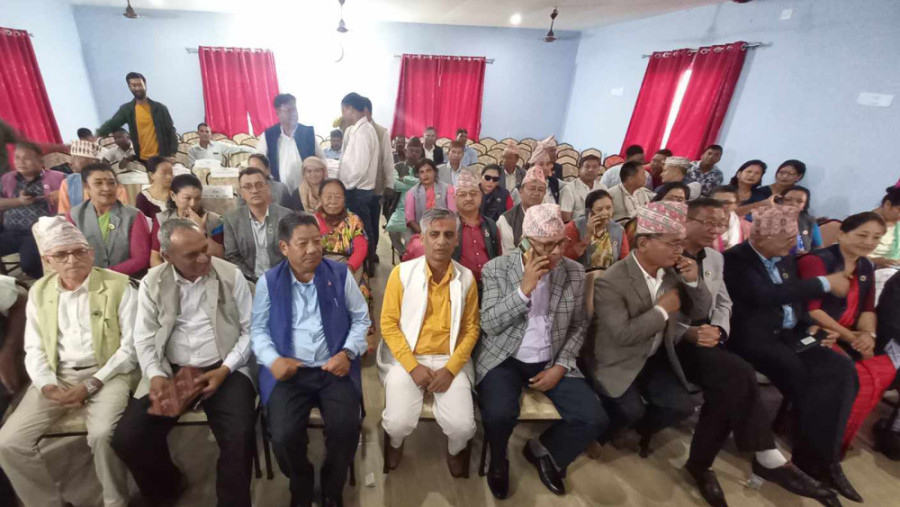Support for UML candidate could be early test of longevity of new coalition in the province.

In a dramatic turn of events, Kedar Karki, a provincial assembly member of Nepali Congress’s dessident faction, became the chief minister of the Koshi Province on Saturday.
Opposing the party’s decision to support Indra Bahadur Angbo of the CPN (Maoist Centre) in the chief ministerial race, eight provincial assembly members from the Congress in the country’s eastern province, decided to form a Karki-led government with the CPN-UML’s support. While 21 members from the party supported Angbo as per the decision of the Congress top brass, eight who were close to dissident Congress leader Shekhar Koirala refused to oblige. Karki became chief minister with support from 39 lawmakers from the UML in the 93-strong provincial assembly.
After their attempts to secure chief ministership for Angbo, the Congress, the Maoist Centre and the CPN (Unified Socialist) have decided to support Karki and keep their political alliance intact. As Karki goes for a floor test on Wednesday, he is sure to get support from all parties except for the Rastriya Prajatantra Party (RPP), which has six seats in the provincial assembly. The pro-Hindu and pro-monarchy party has decided to stay neutral during Wednesday’s vote. As of now, the UML has already joined the government with one ministry.
“This is our government. The other parties were compelled to support Karki as they had no other option,” Rewati Raman Bahandari, the UML’s chief whip in the provincial assembly, told the Post. “We will vote for Karki tomorrow [Wednesday].”
It is clear that the Karki-led government will be getting a thumping majority in the floor test. However, that is not going to end the never-ending political game in Koshi Province which has just had the fifth government in under a year.
The UML has demanded the Speaker’s position in exchange for its support for the Karki government. The position remains vacant after Speaker Baburam Gautam resigned on August 1. Gautam resigned as per the decision of the Maoist Centre, the party he was elected from in the provincial assembly, as he could not lend his support for the formation of the Congress and Maoist Centre government, given his role as Speaker. His support would have secured a majority in the province.
Currently, the UML holds the deputy Speaker’s position. It has to give up the position as per the constitution to claim the Speaker’s post. Article 182 (2) of the statute says there would be one woman out of provincial Speaker and deputy Speaker, and the two must be from different parties.
“We have a claim for the Speaker’s post. Being the largest party it is our legitimate claim,” said Bhandari. However, the provincial assembly members including those from the Kedar Karki faction are undecided. The assembly has yet to decide about electing a new Speaker.
“We haven’t entered that chapter yet. There is no decision to support the UML for the Speaker’s position,” Man Bahadur Limbu of the dissident faction within the Congress, told the Post. “Let’s see how the situation unfolds.” The support of 47 assembly members is needed to be elected the Speaker.
With 40 seats, the UML is the largest party in the assembly. The Congress has 29 seats, the CPN (Maoist Centre) 12, the RPP six, the Unified Socialist four, and the Janata Samajbadi Party has one seat.
The UML needs the backing of seven more lawmakers to claim the position. That will be enough even if only eight lawmakers from the Karki faction support it. Support for the UML’s Speaker candidate could be an early test of the new coalition’s durability in the province.
However, their party, the Congress, can issue a whip to prevent its lawmakers from supporting the UML candidate.
Karki was appointed chief minister as per Article 168(5) of the constitution under which a provincial assembly member can claim the chief ministerial position by producing the support of the majority members. No party whip applies while forming a government under this Article. But the situation would be different for the Speaker’s position.
“The eight dissident provincial assembly members have to obey the Congress whip during the vote for Speaker. They can lose their positions if the party takes action for defying the whip,” senior advocate Dinesh Tripathi, also the chair of the Constitutional Lawyers’ Forum, told the Post.
The UML leaders say they are aware that party whip applies in the vote for Speaker. They say as the Congress-led alliance needs its support to prove majority of the current government, it cannot deny them the Speaker’s post. “The Congress-led alliance has twice failed to prove its majority. I don’t think it would want to repeat the mistake by antagonising the UML. We expect the Congress to support us,” said Bhandari.












